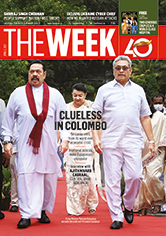It is sad that Sri Lanka is reeling under its worst economic crisis (‘Island of woes’, April 3). The onus is on the Rajapaksa government. It could have avoided the mess with careful planning and wise policy decisions.
India is doing what it can to help. Sri Lanka should know well the difference between India and China. China is never a true ally and will continue to expand its footprints in Sri Lanka, while India will always remain Sri Lanka’s true friend.
Devender Tokas,
On email.
Chinese investments into commercial ports are like the Sword of Damocles. India’s continued financial assistance to Sri Lanka is overshadowed by the massive loans being pumped in by Beijing.
The history of the island nation is replete with miseries caused by prolonged ethnic crisis. Now, its economic recovery depends on the munificence of international funding agencies.
B. Gurumurthy,
On email.
Sri Lanka’s worries are mainly due to bad governance and faulty economics. Its leaders were optimistic and complacent about a stable economy prevailing, prior to the onset of the pandemic. The government was mainly relying on the tourism sector to repay the debts and tide over the economic crisis, which, however, collapsed under the burden of the pandemic.
Sri Lanka should have taken care before blindly investing in non-revenue infrastructure and walking into the debt trap.
M.Y. Shariff,
On email.
Many state governments in India are known to offer populist schemes to attract voters ahead of elections, which is wrong. If such things are not curtailed, it will lead to a dangerous situation and some of these states will go down the same path as cash-starved Sri Lanka.
Populist schemes are not good for the economy and burden the state exchequer. I feel people are also to be blamed, as they fall for these schemes.
Gopika Nambiar,
On email.
Sri Lanka’s state of affairs is an eye-opener for the government of Kerala that is planning to take overseas loans for unrealistic and ecologically dangerous projects like the SilverLine high-speed rail project.
Binoj Mathew C.,
On email.
Dynasty prevails
Sachidananda Murthy has highlighted the dynasty card in Indian politics (‘Power Point’, April 3). The deep-rooted malady of nepotism was diligently nurtured by bigwigs of almost all political parties from the mid-1950s.
Suresh Panje,
On email.
Distaste for BJP
The BJP is losing its sheen among upper castes, due to a multitude of reasons like allegedly giving preferences to lower castes in government schemes and disregarding genuine concerns of upper castes (‘Three to tango’, April 3).
It is common knowledge that the BJP’s victory in the assembly elections in four states was not due to overwhelming support, as claimed by its leaders, but due to absence of any credible opposition that could reflect the aspirations of disgruntled sections of society.
A condescending attitude towards the demands of government employees, perpetual confrontationist approach towards the opposition, one-upmanship between top leadership, hubris among ground-level workers, alleged penchant for corporates and over-polarisation of communal issues have set in a kind of distaste for the BJP.
Devendra Awasthi,
Lucknow.
Need fresh start
A complete overhaul is required in the Congress and leadership change is must for that to happen (‘The grand old mess’, March 27). The Congress, which is on its last legs, has lost its national relevance, and the Gandhis have to exit. If the Congress does not act now, there will be even more embarrassing losses in the coming months.
Sikha Basker,
Bengaluru.
Objection, Swara Bhasker
Swara Bhasker’s column (March 27) was a disgrace. It is outright offensive as she criticises the Karnataka High Court’s decision on hijab, comparing it to the gravest form of humiliation and injustice meted out to Draupadi. By what stretch of imagination can a school uniform be considered imposition of restriction, religious or otherwise?
I denounce the way Swara compared wearing hijab to decent cultural practices in society.
Lalji Dwivedi,
On email.
Swara is usually right in her observations on public issues but in the case of hijab she appears to be way off the mark.
It is not correct to compare turbans of Sikhs, and other customs like wearing bindi or sindoor with hijab. Turbans and other accoutrements have been part of the culture of Sikhs and Hindus from time immemorial. Hijab is something that came up recently.
Dress codes, if laid down anywhere, should be obeyed by all. If one is not in consonance with it, I am sure there are colleges and schools where you can wear what you want. Why not join those institutions? Why insist on joining colleges where rules exist and then not abide by it?
G.K. Balkrishna,
On email.
Empowerment for growth
I fully endorse the views expressed by Bibek Debroy (March 27). Roti, kapada and makaan are basic needs of every human being for leading a decent life. For achieving basic necessities, the education sector needs a complete overhaul with an increased thrust on skill orientation. Moreover, there is an urgent requirement to organise sectors that do not require a lot of skills. Empowering individuals with meaningful skills can help in gaining employment and can pave the way for growth.
Ranju Gulati,
On email.

